Iran Exports To China Decrease Noticeably In First Quarter Of 2023
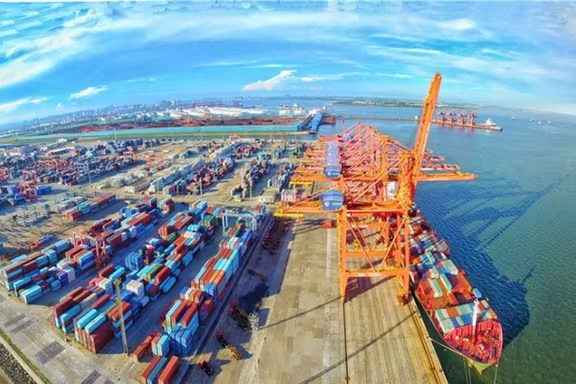
Official Chinese customs data show imports from Iran were $2.9 billion in the first quarter of 2023, which is a decline of more than 41% compared to the first quarter of 2022.

Official Chinese customs data show imports from Iran were $2.9 billion in the first quarter of 2023, which is a decline of more than 41% compared to the first quarter of 2022.
However, according to the Chinese Customs Office, China exported more than four billion dollars of goods to Iran in the mentioned period which is 52% more compared to the same period last year.
The reasons for the significant drop in Iran's exports to China are not clear, but during the past months, Iranian economic experts and businessmen had said that the Russian products are winning the Chinese market.
Earlier, Amin Ebrahimi, CEO of Iran’s Khuzestan Steel Company, stated in an interview that by supplying steel below world prices, Russia has captured the markets that Iran had created for itself during four decades of sanctions.
The figures do not include Iran's illicit oil exports to China, which are registered as cargoes from other countries by the Chinese customs. Iran ships an estimated 800,000 barrels of oil through indirect methods to China, because of US sanctions.
Meanwhile, evidence shows that Russia is taking Iran's oil market share in China as well. Hellenic Shipping News cited data from shipbroker Xclusiv in March saying that Russian crude oil imports into China have reduced the country’s intake of Iranian crude.
The report added that as a result of Chinese appetite for discounted Russian crude, Russian imports have increased sharply, but at the expense of Iranian oil shipments.
In an earlier report, Reuters cited cargo-tracking data as suggesting Chinese imports of Russian crude could hit a record in March.
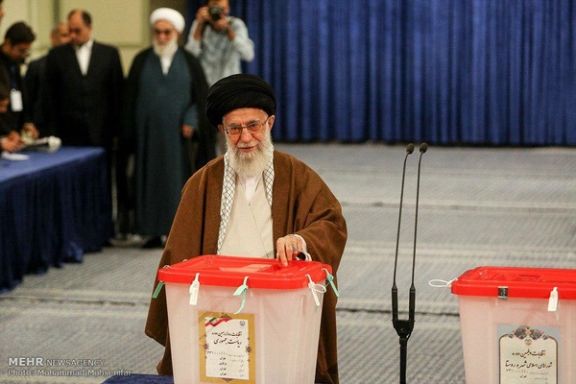
Supreme Leader Ali Khamenei’s strong disapproval of suggestions to let people decide about crucial matters through a referendum has angered many Iranians.
“[Who says] the country’s various issues can be put to referendum? Where in the world do they do that? [Who says] all the people participating in a referendum have the faculty of analyzing that matter? What kind of demand is that?” he said Tuesday at a meeting with some students.
Article 59 of the Constitution of the Islamic Republic, which was approved by a referendum after the Islamic Revolution of 1979, stipulates that in extremely important economic, political, social, and cultural matters, the functions of the legislature may be exercised through direct recourse to popular vote by holding a national referendum.
Any request for such direct recourse to public opinion must be approved by two-thirds of the members of parliament according to the Constitution.
Former President Hassan Rouhani and others have repeatedly suggested holding referendums on “important issues” in domestic and foreign policy. At a meeting with the senior officials of his government, former lawmakers, journalists and politicians on April 5, he reiterated that the answer to people’s demands in the areas of foreign and domestic policies and economy could be found by holding referendums as envisaged by the Constitution of the Islamic Republic.
Some critics such as former reformist lawmaker Mahmoud Sadeghi have argued in favor of a referendum on religious grounds. In a tweet Thursday, he reminded of the Prophet Muhammed’s defeat in the Battle of Uhud after letting the decision of a Muslim council of war prevail against his own.
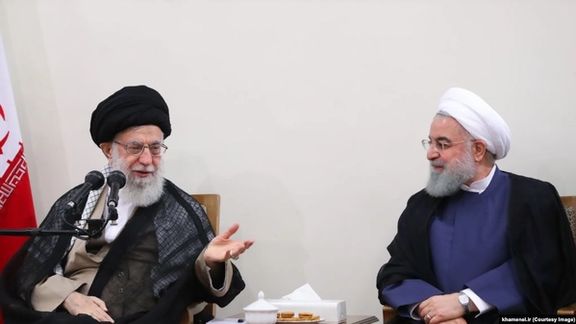
“After the defeat in Uhud War some people criticized the Prophet and asked why he had given in to the view of the majority [who do not have the power of analysis] priority over his own,” he wrote and pointed out that it was then that God sent him the famous Quranic verse 159 of Aali-Imran surah.
The Islamic Association of University Instructors, led by Sadeghi also issued a statement Friday urged Khamenei to “correct” his remark about people’s ineligibility to decide on important matters, and prepare the ground for a referendum.
Critics point out that it was through a yes-no referendum, two months after the revolution, that the new rulers of the country replaced the monarchy with an Islamic Republic. Therefore, the vote taken then also lacked legitimacy according to Khamenei’s logic, expatriate activist Shahriyar Shams tweeted.
Others have criticized Khamenei for double standards, pointing out that in a speech in June 2018 he insisted that the answer to the Israel-Palestine problem would be holding a referendum to decide the type of government in the historical country of Palestine and called it a “modern and advanced method accepted by all.”
Critics also say Khamenei’s insistence that referendum is not common in other countries is sheer fallacy and recounted the many instances including the Brexit referendum in Britain, the referendum for Scottish independence, referendum in Switzerland and Denmark over European Union laws, and the 2017 constitutional referendum in Turkey.
Hardliner loyalists find it hard, given the arguments put forth by the opposition, to defend Khamenei’s new declaration but Abdollah Ganji, the former editor of the IRGC-linked Javan newspaper who is now chief editor of Tehran municipality’s Hamshahri newspaper, in a series of tweets Wednesday said those who speak of a referendum should know that it will be “held by the [current] system itself, not against it.”
“I cannot understand the concurrent impatience of the [foreign-based] opposition and the likes of [Hassan] Rouhani for a referendum… [Suggesting referendum in] domestic or foreign policies is a kind of political-electoral trickery and fraud,” he wrote while claiming that no problems would be solved between Iran and the United States, for example, if people voted to have diplomatic relations with the US in a referendum.
For the second time since the beginning of nationwide protests in mid-September that Rouhani suggested fair and free elections and holding referendums as the only way the regime could overcome huge popular discontent within the existing political structure.
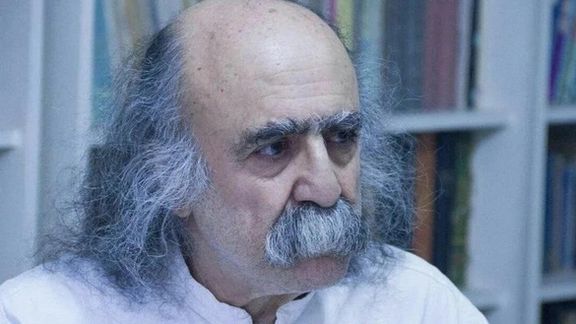
The office of US envoy for Iran has slammed the arrest of journalist Keyvan Samimi, saying that the regime has once again demonstrated how much it fears the people and the truth.
“The act of arresting Mr. Samimi…is a reminder of the degree to which the Iranian regime is incapable of adhering to the most basic international human rights standards and the lengths Iranian authorities will take to silence journalists,” the office of US Special Envoy at the State Department on Friday told the media.
Iran’s state TV announced Thursday that journalist and political activist Keyvan Samimi was once again arrested after his recent release.
The state TV introduced Samimi as an element linked to Mujahedin-e Khalq claiming that he was arrested on charge of "reconnecting with anti-revolutionary groups abroad".
It is not yet known which intelligence outfit arrested the political activist, but Mustafa Nili, a lawyer, wrote in a tweet that even Samimi's son was unaware of his father's arrest.
74-year-old Keyvan Samimi, who is known as the oldest imprisoned journalist in Iran, is the editor-in-chief of "Nameh" magazine. He was released from prison on January 26.
After his release, Samimi supported Green Movement leader Mir-Hossein Mousavi's statement for "holding a free referendum" in Iran and "drafting a new constitution".
Samimi also said in an interview with "Etemad" newspaper that "corruption" in the Islamic Republic began one day after the establishment of the Islamic Republic in 1979.
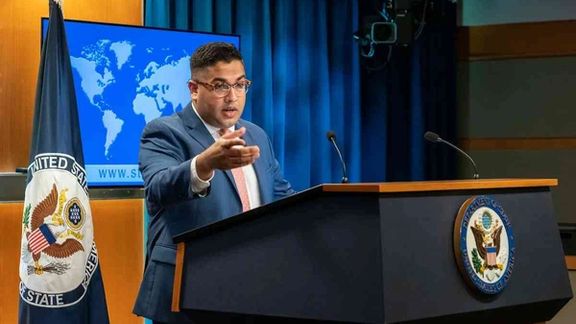
US State Department has once again called on Iran to immediately release three US citizens “wrongfully detained” without due process of law.
The American-Iranian dual nationals are Emad Sharghi, Morad Tahbaz, and Siamak Namazi who were arrested at different times and convicted on trumped-up charges, and in effect held hostage.
Vedant Patel, Principal Deputy Spokesperson of US State Department told a news briefing on Friday that April 23rd, is another sad day for US citizen Emad Sharghi and his family because it marks five years since he was first arrested by the Iranian regime.
“That is five years unjustly separated from his loved ones; five years missing the opportunity to celebrate birthdays and anniversaries. Today, Emad remains wrongfully detained in Evin Prison on bogus charges after being tried in absentia with no access to the evidence himself.”
He went on to say that there is no higher priority for Washington than ensuring the release of American nationals wrongfully detained overseas, and the State Department is working relentlessly to make sure that US nationals detained in Iran are released.
“The unjust imprisonment and exploitation of US nationals as political leverage is outrageous, inhumane, and contrary to international norms,” added Patel.
Iran routinely arrests people with Western passports and uses them as hostages and bargaining chips, but Washington avoids the term 'hostage taking', calling it “unlawful detention.”
Emad Shargi is an Iranian-American businessman who was convicted of espionage without a transparent trial and sentenced to 10 years in prison in 2020.
Morad Tahbaz, 66, is a British-US-Iranian triple national who was arrested in January 2018 and sentenced to 10 years in prison on “espionage” charges.
Siamak Namazi, is another dual-national businessman, who was arrested and imprisoned in October 2015 on charges of "collaborating with the US government".
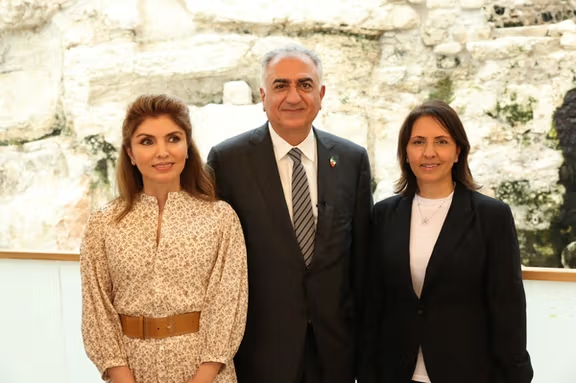
Iran’s exiled prince Reza Pahlavi left Israel on Friday afternoon after five days of meetings with senior officials and visits to cultural and scientific centers.
Israel’s Intelligence Minister Gila Gamliel, who was officially hosting Pahlavi and his wife, Jasmine, during their five-day stay, said Friday that the Iranians and Israelis can move on the path of progress together.
The new path between the nations has just begun, she said, sharing a video of some of the highlights of the historic visit.
"The visit of the Iranian crown prince that I led this week is only the beginning on the way to bringing hearts together and building bridges between the nations,” she said in a tweet in Hebrew.
In other tweets both in Hebrew and Persian, the Israeli official said that Pahlavi is a brave leader in the eyes of Israel and the free world, adding that “Together we stand against the axis of evil and this is the beginning of the road.” Axis of evil was a term coined by the US administration of President George Bush in 2002 to refer to the Islamic Republic, Saddam's Iraq and North Korea.
Gamliel underlined that while the Islamic Republic is disrupting the security of Israeli borders, Pahlavi and Israeli officials are building bridges between the tow nations. She made the comment after a meeting between Pahlavi and Minister of Strategic Affairs Ron Dermer and National Security Advisor Tzachi Hanegbi.
On the last day of his trip, Pahlavi delivered a speech at University of Haifa, where he laid out his vision for a future democratic Iran and amicable ties between the two countries, which he described as rooted in over 2,500 years of history and based on the shared democratic values, including respect for the rule of law, human rights, and religious freedom.
He renewed his call to the international community “to decide which side of history they want to stand.” “Do they stand with us (opposing the Islamic Republic) or do they remain silent?” he said. Quoting Martin Luther King, Pahlavi said, “In the end, we will remember not the words of our enemies, but the silence of our friends.”
Pahlavi also visited the Baha’i World Centre in Haifa, saying that he was touched by their “message of unity and togetherness.”
Established by Bahaullah in the 19th century, the Baha’i faith initially spread in Iran and parts of the former Ottoman Empire. For nearly three centuries the Baha’is have been persecuted in Iran to varying degrees and subjected to mob attacks often instigated by the Shia clergy.
Supreme Leader Ali Khamenei has on several occasions called the Baha'i Faith a cult and in a religious fatwa in 2018 forbade contact, including business dealings, with followers of the faith. Baha'is, who number around 300,000 in Iran, say their rights are systematically violated and they are often harassed, forced to leave their homes and businesses, and are deprived of government jobs and university education.
During a press conference in Tel Aviv on Wednesday, Pahlavi said that Iranians are the extreme opposite of the country’s current rulers, and that the regime does not represent the Iranian nation. “They have no antagonism to any nation or any faith. I know that Iranians and Israelis see how important it would be for our future to be strategic partners, to work together, to address many issues. I come here to convey this message to Israeli citizens,” he said.
Referring to the 2020 US-brokered Abraham Accords aimed at normalizing relations between Israel, the United Arab Emirates and Bahrain, Pahlavi also expressed hope for a “Cyrus Accord” for peace between Tehran and Jerusalem.
While Pahlavi was promoting peace with the Israelis, Islamic Republic’s President Ebrahim Raisi threatened to destroy the Israeli cities of Tel Aviv and Haifa in an inflammatory speech in Tehran on Tuesday.

During his stay, Pahlavi visited the Wailing Wall and attended the ceremony to mark Israel's Holocaust Remembrance Day at the Yad Vashem memorial in Jerusalem. He also met with Prime Minister Benjamin Netanyahu twice and President Isaac Herzog. One of the main goals of Pahlavi’s visit was exploring ways to solve the water crisis in Iran with the help of Israeli experts. In line with this goal, he also visited Sorek Desalination Plant.
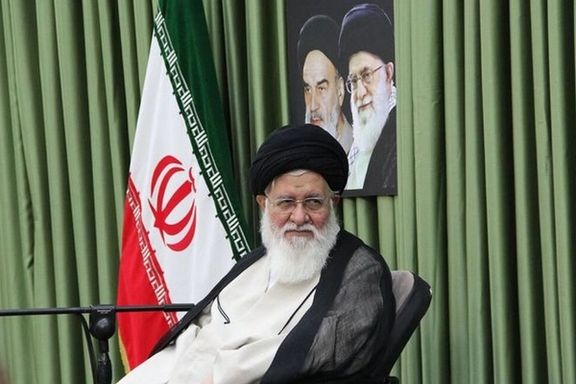
Amid high inflation and the declining value of Iran’s currency, an influential ayatollah says buying gold and foreign currencies as investment is a sin.
Ayatollah Ahmad Alamolhoda, father-in-law of President Ebrahim Raisi and Supreme Leader Ali Khamenei’s representative in the religious city of Mashhad, is known for his fundamentalist views, who is famous for banning cultural activities in the city.
Alamolhoda said in his Friday sermon April 21 that if people convert their capital to foreign currencies and gold it is sin “equal to hoarding and profiteering,” which is considered an offence according to Sharia.
Iran’s currency, the rial, has halved in value since mid-2022, with inflation above 50 percent and the middle class fast becoming impoverished. The US dollar has risen from 260,000 rials to around 520,000 since August.
People have been trying to invest in foreign currencies, gold and those with more resources in real estate to preserve their savings.
Alamolhoda also referred to women refusing to wear headscarves, which has angered religious hardliners. He said the Islamic Republic faces two big challenges: Economic crisis and a cultural crisis. He insisted however that these two problems are not related to one another.
Ordinary people who have been protesting against the regime, see the economic crisis as the result of government’s foreign policy and mismanagement and the enforcement of hijab as its undue interference in their private lives.
The regime that has refused to compromise over its nuclear program with the West, is determined to use repression to pacify the population.